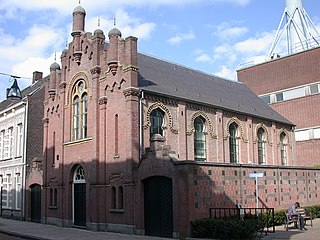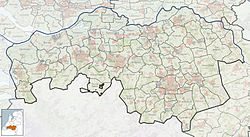
Tilburg is a city and municipality in the Netherlands, in the southern province of North Brabant. With a population of 222,601, it is the second-largest city or municipality in North Brabant after Eindhoven and the seventh-largest in the Netherlands as a whole.

North Brabant, also unofficially called Brabant, is a province in the south of the Netherlands. It borders the provinces of South Holland and Gelderland to the north, Limburg to the east, Zeeland to the west, and the Flemish provinces of Antwerp and Limburg to the south. The northern border follows the Meuse westward to its mouth in the Hollands Diep strait, part of the Rhine–Meuse–Scheldt delta. North Brabant has a population of 2,562,566 as of November 2019. Major cities in North Brabant are Eindhoven, Tilburg, Breda, its provincial capital 's-Hertogenbosch, and Helmond

Oisterwijk is a municipality and a city in the south of the Netherlands.

Maaseik is a city and municipality in the Belgian province of Limburg. Both in size and in population, it is the 8th largest municipality in Limburg. The town is the seat of the administrative arrondissement of Maaseik (kieskanton). Internationally, Maaseik is known as the assumed birthplace of the famous Flemish painters Jan and Hubert van Eyck.

The Amstel is a river in the province of North Holland in the Netherlands. It flows from the Aarkanaal and Drecht in Nieuwveen northwards, passing Uithoorn, Amstelveen, and Ouderkerk aan de Amstel, to the IJ in Amsterdam, to which the river gives its name. Annually, the river is the location of the Liberation Day concert, Head of the River Amstel rowing match, and the Amsterdam Gay Pride boat parade.

De Koningshoeven Brewery (Brouwerij de Koningshoeven) is a Dutch Trappist brewery founded in 1884 within the walls of Koningshoeven Abbey (Abdij Onze Lieve Vrouw van Koningshoeven) in Berkel-Enschot (near Tilburg).

Beer in the Netherlands mostly comprises pale lagers like Heineken and Grolsch. Heineken is the world's second-largest brewer.

The Campine or De Kempen is a natural region situated chiefly in north-eastern Belgium and parts of the south-eastern Netherlands which once consisted mainly of extensive moors, tracts of sandy heath, and wetlands. It encompasses a large northern and eastern portion of Antwerp Province and adjacent parts of Limburg in Belgium, as well as portions of the Dutch province of North Brabant and Dutch Limburg around Weert.

Heukelom is a village in the Dutch province of North Brabant, next to Oisterwijk and Berkel-Enschot.

The history of the Jews in Tilburg, Netherlands, did not start until 1767, when a Jewish citizen of the town Oisterwijk was given permission to settle in Tilburg, despite objections from the city council. Several Jewish families also succeeded in settling in Tilburg soon afterwards in 1791.

Nicolaas ("Nico") Cornelis Maria Verhoeven is a retired road bicycle racer from the Netherlands, who was a professional rider from 1985 to 1995. He represented his native country at the 1984 Summer Olympics in Los Angeles, in the individual road race where he didn't finish the race. Verhoeven won the first stage in the 1987 Tour de France.

Moergestel is a village in the Dutch province of North Brabant. It is located in the municipality of Oisterwijk, about 7 km East of Tilburg.

Udenhout is a village and a former municipality in the Dutch province of North Brabant. It is located northeast of Tilburg, north of Berkel-Enschot and south of the National Parc Loonse en Drunense Duinen.

De Falom is a village in the Dantumadiel municipality of Friesland, the Netherlands. It had a population of 235 in 2017.

Wytgaard is a village in Leeuwarden municipality in the province of Friesland, the Netherlands. It had a population of around 570 in January 2017.

Tilburg railway station is a railway station located in Tilburg in the province of North Brabant, Netherlands. The station was opened on 5 October 1863 and is located on the Breda–Eindhoven railway and Tilburg–Nijmegen railway. The train services are operated by Nederlandse Spoorwegen (NS).

Koningshoeven Abbey is a monastery of the Trappists founded in 1881 in Berkel-Enschot in North Brabant, the Netherlands.
Fransiskus "Frans" Harjawiyata O.C.S.O. was an Indonesian Roman Catholic monastic abbot and member of the Order of Cistercians of the Strict Observance, who are more commonly known as the Trappists. Harjawiyata, who was the first Indonesian-born Trappist abbot in the country's history, headed the St. Mary's of Rawaseneng Monastery in Temanggung Regency, Central Java province, from 1978 to 2006. Harjawiyata is credited with helping to develop Christianity in Indonesia by translating Catholic scriptures and chants into Indonesian. He translated the Breviary from Latin into Indonesian, authored several books on spirituality, and composed several Indonesian-language Gregorian chants. His chants are still performed in Catholic churches throughout Indonesia today.

The Wilhelmina Canal is a canal in North-Brabant, Netherlands. It connects Tilburg to the Meuse, and continues to the east to connect to the Zuid-Willemsvaart north of Helmond.

























